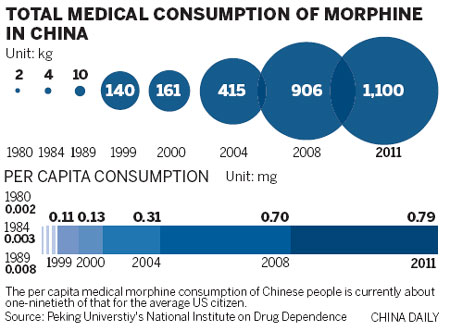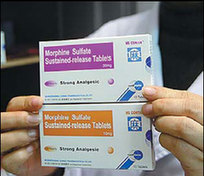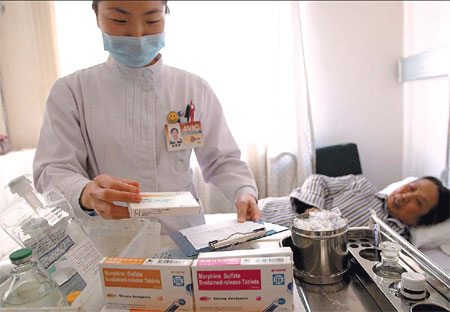Morphine is culturally a tough medicine
Updated: 2013-02-25 07:56
By Zhao Xu (China Daily)
|
||||||||
|
A nurse selects morphine tablets for a patient at Beijing Aviation General Hospital. Many patients fear that they may become addicted to the drug. Photos by Zhang Wei / China Daily |


Despite its benefits as a painkiller, drug finds few backers among doctors, reports Zhao Xu in Beijing.
As a high-profile oncologist and pain-control expert, Liu Duanqi had never been faced with the prospect of cutting short a lecture when in full flow - or even how to react to a request to do so. That is, until he found himself in that situation when the suggestion was put forward, not so politely, by a municipal health officer at a relatively remote northern city around 12 years ago.
"My topic was the use of morphine to alleviate cancer pain. A little more than 20 minutes into the lecture, I started to get the first of a steady flow of paper slips, secretly passed to me by our local contact man who'd been effusive in his praise for the 'expert from Beijing'," recalled Liu. "On the paper was a scribbled request: 'Could you please end your speech in 15 minutes?'"
Bewildered, Liu was tempted to think that he'd been talking too long and had accidentally taken up time reserved for the next speaker, although this seemed highly unlikely. Things became clearer when the tentative suggestion turned into an urgent plea, then a thinly veiled demand and finally, a direct order as an apparently irate official strode onto the stage, snatched the microphone from his stunned guest and announced flatly, "I wouldn't have invited Professor Liu if I'd known what he was planning to talk about".
Blame morphine for the unexpected and deeply embarrassing "showdown" - at least that seemed to be the mindset of Liu's sulking host. In fact, according to Liu, former director of the oncology department at the General Army Hospital in Beijing, as one of China's principal proponents of its use, the medicine - or dangerous drug, depending as much on people's perception as on its actual use - has more than once put him at the center of conflict.
To put it simply, a medicine recommended by the World Health Organization as the most effective treatment for severe and chronic pain is still widely viewed in China as something that people should avoid at all costs, even if they are suffering miserably and have a clinically estimated life expectancy of no more than a few months.
Addiction concerns
"The key word is addiction," said Liu.
However, this is not addiction in the common sense of the word, but one that, according to Xu Guozhu, former director of Peking University's National Institute on Drug Dependence, "dragged the Middle Kingdom to its knees more than one and a half centuries ago and has punched fear deep into the hearts of all her citizens ever since".
"Leaf through any Chinese history book and the First Opium War of 1840 marks the beginning of the country's contemporary history, the beginning of a vast nation's seemingly incessant humiliation at the hands of foreign powers and its long, tortuous and blood-stained road to revival," said Xu, referring to a conflict triggered when British merchants dumped large quantities of opium on the Chinese coast and its subsequent confiscation by concerned Chinese officials.
The war ended in a crushing defeat for the Qing court, whose drug-emaciated subjects were scoffed at by the victors as "the sick men of the East".
By all evidence, that vicious plume of smoke has long dissipated, but the specter remains. And morphine, as a close relative of opium - both are derived directly from the resin of the opium poppy, with the former being "purer and stronger", according to Xu - has endured its "fair" share of suspicion, dread, and plain disgust.
Except that it's all "pure misperception", said Xu, who has personally monitored the clinical tests of nearly 50 types of morphine-based drugs in China, both imported and locally manufactured.
"Clinical observations show that pain itself is capable of putting up the most powerful defense against any potential addiction," he said. "In other words, patients who take morphine for pain relief are much less likely to get hooked than those who do so recreationally, for fun."
One example is the US involvement in the Vietnam War between 1961 and 1973, during which morphine was given extensively to wounded US soldiers. Signs of addiction were later found not in those for whom the medicine was intended, but in their fellow soldiers who had managed to procure the drug with the objective of getting "high".
"Staying away from pain with morphine's help does not mean letting yourself come dangerously close to the claws of addition," said Xu. "The WHO has whittled down the addiction rate for patients using morphine to less than 0.06 percent - the number speaks for itself about the absurdity of rejecting the medicine."
The severity of the issue first rang alarm bells for Chinese policy makers in the early 1990s, as the country began to adopt the WHO's Three-Step Analgesic Ladder in Cancer Pain Relief, a document published in 1986 with the aim of legitimizing and thereby increasing the prescription of morphine, especially among cancer patients in the globe's less developed regions.
It's a battle both Liu and Xu have joined, as they led the charge and pushed the frontiers forward, slowly but consistently, for two decades. Ground has been taken and victories claimed. In 2011 - the latest figures available - the total medical consumption of morphine in China reached 1,100 kilograms. That's roughly 0.79 mg per person, more than six times higher than the number for 1999, and nearly 400 times that of 1980, when per capita morphine consumption in China was a mere 0.002mg.
One milestone breakthrough came in 1998, when the Health Ministry scraped the upper limit capping the total amount of morphine a cancer patient is entitled to during the entire process of treatment. Another followed two years later, when all Chinese hospitals were granted unlimited access to morphine, based on need instead of the number of beds in their wards, as was previously stipulated.
Deeply ingrained fears
However, despite the huge progress, Xu said he has no illusions about the scale of the problem in China. Among the multiple hurdles still to be overcome, the deeply ingrained fear expressed by patients represents the initial obstacle.
Yan Runlan has first hand knowledge of this. Lying in bed in the oncology ward of Beijing's Aviation General Hospital and fully aware of her situation, the 67-year-old, who has terminal stomach and colon cancer, balked not at the inevitable outcome of her illness, but at the two small morphine tablets on her bedside table.
"There will come a day when I'm standing right on the doorstep of death and experiencing debilitating pain - I want to save all my morphine quota for that day," she said. "If I start to take it right now, I might become addicted before that moment arrives."
This, despite the fact that Yan has been repeatedly assured by the doctors and nurses that she can only reasonably look forward to another six months of life, and that the ever-increasing levels of pain mean her limbs tremble involuntarily.
Liu Yin, Yan's attending physician and the director of the oncology department, has seen many similar reactions: "It's not uncommon for patients to hide the morphine pills they've been prescribed, sometimes abetted and assisted by their equally concerned relatives. The thought of an undignified death as a drug addict tortures them."
In the darkest and often most-neglected corner of a dying man's heart, psychological terror has a much firmer reign than physical agony. Physicians, with their immense sway over patients, are often blamed for not tending to that corner, not always for the wrong reasons.
Ning Xiaohong, an oncologist and palliative care expert at Peking Union Medical College Hospital, said that the strong, yet often subconscious, resistance to morphine use among Chinese doctors is something closer to the heart of the problem.
"Sadly, many of our so-called health professionals are themselves unwitting believers of the addiction theory," reflected the doctor. "By withholding a definite answer when questioned by a concerned patient, and by not providing proof convincing enough to dispel the doubts, a doctor could actually serve to reinforce the patient's existing fears."
This is aggravated by a strong tendency among Chinese doctors to trust no one but themselves.
"They believe that they are the only ones in a position to judge whether a patient is suffering sufficiently to qualify for morphine administration. In most cases, decisions are based purely on 'subjective evaluations' - various figures yielded by clinical tests pointing to a specific stage of the illness," said Ning. "The WHO has long deemed this approach arbitrary and obsolete."
One concept she emphasized is "Total Pain", that is, the sum total of a patient's physical and psychological suffering, which is usually much higher than the former alone. "Depressed and inconsolable, a cancer patient routinely feels a level of pain that would be theoretically associated with a still-to-come stage of their disease," said Ning. "Not many Chinese doctors have a deep understanding of that."
The underestimation of pain could lead directly to the under prescription of morphine and other analgesics, as desperate patients are urged by their omniscient doctors "to be strong".
Cruel as it sounds, to put the doctors alone on trial would be to tiptoe around the very core of the issue, which lies with the management, from the various levels of local government all the way down to the leadership of each and every hospital.
"In China and many other countries, the sale, purchase and consumption of morphine for recreational purposes are all crimes punishable by imprisonment. While the government has correctly taken a very strong stance against all possible flows of morphine into society, it has to work equally hard to meet the urgent needs of those whose pain cannot be alleviated without it," said Liu the oncologist. "The reality for the moment is: Although the Central Government is unequivocal in its message, the seismic waves for change lose much of their power in hospitals situated a long distance from Beijing."
Twenty years ago, an outpatient could ask the doctor for a prescription of morphine that would last a maximum of three days. However, in 2002, the Health Ministry extended the number of days to 15. Even today, only half of all Chinese hospitals act on that standard. For doctors, this passive approach amounts to effective discouragement.
"For every morphine pill given to a patient, especially an outpatient, there's a possibility - although this very rarely happens in reality - that it will find its way into the hands of someone else," said Liu. "When this does happen, there's bound to be a police investigation. And it appears to me that some health officials are simply more interested in holding onto power and staying out of trouble than reducing the toll that cancer pain takes on its victims."
According to Liu, even with the 2011 figure of 0.79 mg per person, China still ranks just below 100 among the more than 120 countries that have submitted their numbers to the WHO, which considers it the foremost indicator of a nation's pain relief effort. And the per capita medical morphine consumption of Chinese people is currently about one-ninetieth of that for the average US citizen.
Twenty years ago, Liu was running a first aid training class for students from neighboring Southeast Asian countries. One day, the victim of a car accident was rushed to the hospital, bleeding and groaning. While all the Chinese staff were busy chasing up various pieces of medical equipment, a young Pakistani intern was making wild gestures and shouting out in his weirdly accented Chinese, "Morphine! Morphine!"
"His voice has stayed with me ever since," said Liu, "not because of what he said, but because of his willingness to feel so much of the pain that the injured man must have felt."
Contact the writer at zhaoxu@chinadaily.com.cn

(China Daily 02/25/2013 page6)

 In Photos: 7.0-magnitude quake hits Sichuan
In Photos: 7.0-magnitude quake hits Sichuan
 Li Na on Time cover, makes influential 100 list
Li Na on Time cover, makes influential 100 list
 FBI releases photos of 2 Boston bombings suspects
FBI releases photos of 2 Boston bombings suspects
 World's wackiest hairstyles
World's wackiest hairstyles
 Sandstorms strike Northwest China
Sandstorms strike Northwest China
 Never-seen photos of Madonna on display
Never-seen photos of Madonna on display
 H7N9 outbreak linked to waterfowl migration
H7N9 outbreak linked to waterfowl migration
 Dozens feared dead in Texas plant blast
Dozens feared dead in Texas plant blast
Most Viewed
Editor's Picks

|

|

|

|

|

|
Today's Top News
Live report: 7.0-magnitude quake hits Sichuan, heavy casualties feared
Boston suspect cornered on boat
Cross-talk artist helps to spread the word
'Green' awareness levels drop in Beijing
Palace Museum spruces up
First couple on Time's list of most influential
H7N9 flu transmission studied
Trading channels 'need to broaden'
US Weekly

|

|








